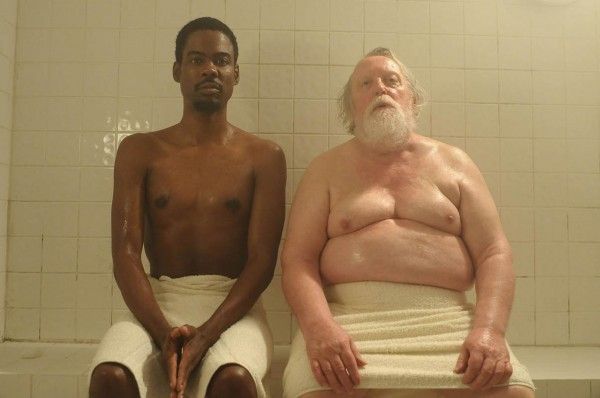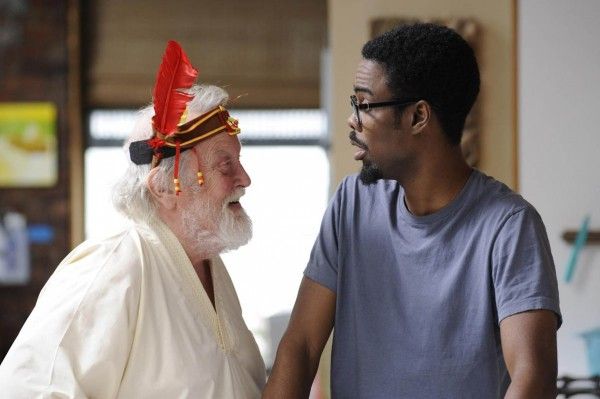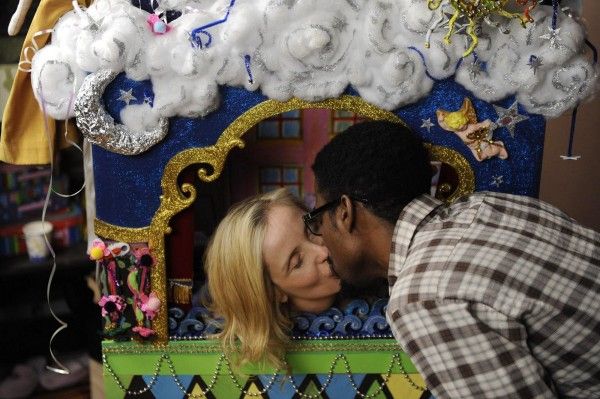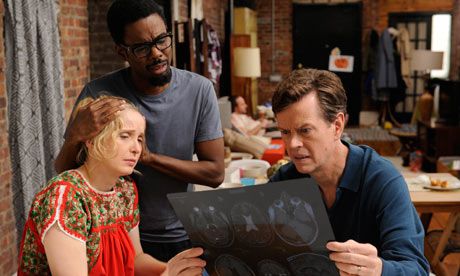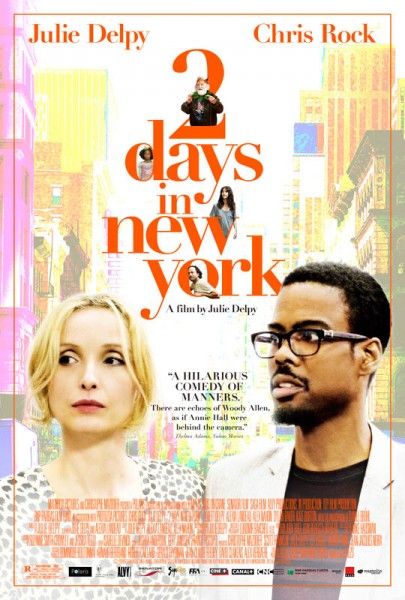2 Days in New York stars Chris Rock and Julie Delpy as a couple who go through two unforgettable days of mayhem when her family comes for a visit and pushes every button in the couple’s relationship. The quirky comedy, which opens in theaters on August 10th, is written and directed by Delpy and also features Albert Delpy, Alexia Landeau, Alex Nahon, Emily Wagner, Dylan Baker and John Gallo.
In an exclusive phone interview today, I spoke to the multi-talented Delpy about what inspired her to make the film. The actress/screenwriter/director talked to me about why she cast Rock in the lead, how American perceptions of the French are often inaccurate, how she collaborated with her editor on the film’s comedic timing, her writing process, her comedic influences and shooting in New York City. She also discussed her upcoming projects: The Right Profile, a biopic about the life of Clash frontman Joe Strummer, which she may direct, and a possible follow-up to Before Sunset that she’s writing with Ethan Hawke and Richard Linklater. Hit the jump for more.
Question: What was it about this story that appealed to you as a filmmaker?
Julie Delpy: I wanted to do a romantic comedy but with the real thing. You grow up, you have kids. It’s all about compromise. Your parents die. How do you handle life? Things don’t work out for the best. You’re not a great artist. You have to sell your soul. (laughs) All the stuff that life is made of.
How much of Marion is inspired by you in real life?
Delpy: Less than people think. There are elements of truth but a lot of it is very fictional. I’m not in a situation family-wise. I don’t have a sister that dates my ex-boyfriends, or a sister period. I’m not a photographer living in New York. There are a lot of things that are actually different from me. I’m not a hysterical, out of control, raging maniac, not that I know of. I’m not that confused either. I’m pretty much in control of my life. I’m not selling my soul to anyone, especially not to the person I sell it to in this film.
What led you to cast Chris Rock as Marion’s new boyfriend?
Delpy: I’ve always loved his stand-up and that’s the first person who came to my mind when I started writing a sequel. I was like Marion is not with the same guy. That I knew. I had decided that it didn’t work out with Jack. She probably has a kid. And then, she has a new boyfriend. I was like “Okay! Chris Rock! That’s it.”
A lot of the humor in this is inspired by miscommunication and the culture clash that results when her family comes to visit. How did you approach that aspect of the story?
Delpy: I feel like most of our life is miscommunication, and when you add a language barrier to it, it just becomes total mayhem and confusion. I liked this idea of extreme miscommunication between couples and family members and all that. It just adds to it with all of the cultural differences. It could be an American family meeting another American family and you could still have a total clash. With family, it’s like visiting another planet.
Americans seem to have a lot of misperceptions about the French. How did you go about turning these cultural stereotypes on their head for comedic effect?
Delpy: A lot of Americans see the French as these classy people wearing Chanel all the time. I’m sorry to break the news to people that want to think that the French are all like that. There’s a very strong culture of France that’s not super classy. Actually those people are not ‘not’ classy. The dad is obviously an educated man and he likes Easy Rider. He’s not white trash. But, he’s also a free thinker and a free spirit, something that’s very common in some part of the French. There’s a lot of that. There’s the generation of May ’68, a generation of very free-spirited people. Also, definitely something that’s French is they’re not puritanical at all. Even the French bourgeoisie is not very puritanical. They can be uptight, but the subject of sex is something that everyone talks about in France. So, it’s not very puritanical in a sense. Our kings had lovers. Our presidents are pigs. It’s a well known fact that every French president has had 400 lovers. It doesn’t make sense to be a president if you don’t have lovers. What’s the point then?
You created such a wonderful love-hate dynamic between the two sisters. Can you talk about where you drew the inspiration for that?
Delpy: It’s because we do have that in real life a little bit and also because I’ve witnessed a lot of my friends with their sisters. I don’t have a sister or brother so I don’t personally know that kind of relationship, but I wrote most of the sisters’ relationship in the film, weirdly enough and she (Alexia Landeau) didn’t. I wrote the part that she could have written better than me, but in a way, imagination sometimes is capable of imagining better than the people living it. It’s like my fantasy of a relationship with a sister is actually very close to a lot of people’s relationships with their sister or at least the few people I know that have a relationship with their sister. I enjoyed writing the fights and the hair pulling and all the moments where suddenly they become seven years old again. I like the idea that the dynamic of childhood comes back to them. I’ve seen that in friends of mine. Suddenly, they’re with their mom and they become like a little boy and the mom makes them muffins.
How was it working with your father again? Do you direct him differently than the rest of the cast because you know each other so well and already have a shorthand?
Delpy: I direct him like anyone else. I still tell him what I want and how we can get there and how we can achieve this and that. We have a few disagreements sometimes, but very little, and then we figure it out. I’d say sometimes it’s a little harder for him to get direction from his daughter than it would be, for example, me directing Chris Rock or everyone else on the set. I don’t like to be overly directing people either. I tell them what I want and I tell them when it’s wrong. I tell them no, that’s not what I want. I want it more like this or more like that. I’m pretty direct with everyone, and I treat everyone the same which might be good. I treat my dad just like the way I treat Chris Rock and just like the way I treat Alexia, although Alexia I like to torture a little bit. I think she deserves it. (laughs) But I’m joking. It’s that dynamic of … I’m a little sadistic, but it’s actually very funny. It’s not weird at all. It’s not creepy. I love her so much. She’s so much fun. I love telling her really funny things. I love to pull [her leg]. She’s good to tease.
How do you feel about your actors improvising and do you use improv when you’re directing?
Delpy: I don’t do too much improvisation. People ad-lib a line here or there. I usually do all the takes. Most of the takes are with the dialogue that’s written. Then sometimes, if I feel like it, I do the last take and I say okay, let’s do something totally different either on the acting or on the dialogue, like go for something a little crazier or let yourself go. Or I’ll tell my dad at the end of this bit, now I want you to tickle him and go totally crazy. But it’s not really improvised. It is ad-libbed. There are a few ad-libbed lines in the film, but I would say most of it is written, surprisingly. I was reading the screenplay again because I had to send it to a publishing place and I had to proofread it, and I was surprised that so much of it was written. Myself, I was surprised because sometimes with the acting I try to achieve something that’s as natural as possible in the acting, so sometimes I even forget those lines I’ve written. I have to tell you that I even forget about what’s written and not written. But there were some ad-libbed lines. I would say maybe three percent was ad-libbed.
How would you describe your comedic sense? Where does it come from? What are your favorite types of comedy and what filmmakers inspire you?
Delpy: I love different kinds of comedies. I like very much the few comedies that Martin Scorsese made like King of Comedy. Those are my favorite comedies. I think my favorite comedy of all time is King of Comedy probably. I like Woody Allen. I love the crazy Woody Allen period like Bananas, but I also love Husbands and Wives which is so cruel in the relationships. I like After Hours by Scorsese. I also like the old movies, the Cary Grant comedies and the Ernst Lubitsch movies that are like farces.
Screwball comedies?
Delpy: Yes, exactly. I like all sorts. There are many things I like. My taste goes in many different directions.
How did you collaborate with your film editor, Isabelle Devinck, on the film’s comedic timing? Do you share a similar sensibility and how would you describe it?
Delpy: Actually it’s fantastic. The way I work is that I never let people do an assembly. I don’t like it because it shapes the film in a way that I can’t really control. To me, editing is making the film and it’s a huge process and editors are under-rated. They’re not given the credit they should be given because I think editing is making the film and a big part of it. And so, my process is I am usually at the computer because I love being at the computer, so I’m using the Avid and doing the editing. The way I work with her is we bounce the ideas off each other. It’s like the writing process. It’s not all written in stone. Sometimes she’s at the computer. She can try a scene and then I’m like “Okay, no, that doesn’t work for me, but let’s try it this way.” And then, I go back to the computer and do it my way. It’s a lovely process. Editing is great. I love it. It’s really making the film and giving it life. It’s like you have all the elements and then you sew the doll together. You have the fabric and the felt and all that, and then you put it all together. Otherwise, it’s nothing.
What inspired Mingus’s informal chat with President Obama? Was that always in the script?
Delpy: Yes, that was one of the first things I wrote actually in the film. I wanted Mingus to seem like the guy that’s the non-crazy one, but he has that little private craziness, and he talks to the President about his love life and about the most mundane things. He has that fantasy that one day he’s going to interview him, and they’re going to become friends and hang out and talk about their mutual relationships. I just think it’s very funny. I thought the idea would be very funny to do.
How was it shooting in New York City?
Delpy: I liked shooting in New York. It’s not the easiest city to shoot in, especially when it’s a union film with all the trailers. It’s like a moving circus. But it was great. It’s so beautiful and it’s great to shoot in New York. It’s just not the easiest city to shoot in. It’s noisy. There’s crazy people screaming and coming into the middle of the shot. It’s New York City. You adapt.
The film has a very vibrant look and visual style. How did you work with your DP, Lubomir Bakchev, to achieve that?
Delpy: Lubomir and I went to a few places. It was very hard to get locations. It’s surprisingly hard to get people to let us film places, but then, if you push a little, you get the places. The Belvedere Castle, we almost didn’t get it. But then, when you push a little bit, then you get all those places which is great. It’s not a very expensive film, so it’s hard to get those locations because it’s expensive.
Can you talk about writing the script with Alexia Landeau and Alex Nahon and how the three of you worked together?
Delpy: What we did is, I worked a little bit with Alex. I mean, first I wrote by myself. I started thinking about the story altogether by myself. Then I had Alex come in and we started thinking of ideas and stuff. Then Alexia joined and the writing process was more with Alexia than with Alex. I let her write a scene or two and then we would bounce ideas off each other. I would write a scene and she would have a pass at it and vice versa. It was a process where we would meet and just write, and then we would write separately as well. It’s not a written-in-stone process. Her writing is never something that’s very clear. It’s always someone does this, someone does that. Then you take this scene and you throw it away and you write another one. You have to feel it. It’s very organic. It’s not a very clear process.
What was the most unexpectedly fun part of making this film and then what was the part that you could have lived without?
Delpy: The fun parts, for example, I have to say were the unexpected moments. I wasn’t sure how I was going to do the scene with John Gallo which was very different from the rest of the film and was a lot of fun. And, working with friends is quite fun. Like working with Alexia and having laughs and just having a good time on the set, having a fun time. Sometimes it’s having a hard time too, but I would say fifty percent is painful ad fifty percent is very pleasurable. It’s a mix and it’s nothing in between. The part I could have really lived without was part of the money missing two days before we started shooting and we had to push the film two weeks. I almost lost my mind. I had to spend 48 hours on the phone straight with the European financiers to get this film happening. That’s painful, but that’s part of the game. So, I don’t consider it awful. It’s just tiring. It makes you really tired. When you’re on the phone for 48 hours straight, you’re just exhausted. It makes you crazy in the head because you don’t sleep, you don’t eat for three days. It’s really stressful.
What was it like shooting that scene with Gallo?
Delpy: It was great. I loved working with him. He’s lovely. Everyone I worked with on this film was great. I loved working obviously with Chris, and Kate Burton and being in the elevator with her, and Dylan Baker. Everyone in the film was great to work with. But Gallo, I was in love with. I love looking at his face. It’s just something I love. I think he has the most beautiful, interesting face and the most alive eyes I’ve ever seen, like he’s really present. It’s amazing to look into his face. I find him really beautiful and not in a cheesy way. He has a really interesting and amazing face. I’ve known him for four years so it’s not like the first time I’ve looked at his face. I’ve been a friend of his for many years. I know him.
How did you get him involved in the project?
Delpy: He was an old friend. I wrote the part for him. I called him. With Chris, it was funny, I did the same. I did something that people don’t do. I called his agent who happened to be an old agent of mine and I just said straightforward “I’m going to write a script for Chris. Do you think he’d like to work with me?” I didn’t go around tons of [red tape]. It’s great to do things simply. I know it doesn’t happen very much like that in Hollywood. It’s really refreshing to do that. I think there are a lot of legal issues here where I can’t really talk directly to people. My agent told me I should have let him call first. I bypassed some steps, but it’s okay. That agent was an old agent of mine. I knew him and he was very friendly.
You have a number of projects coming up including Les Passages and The Right Profile. Can you tell me a little bit about them?
Delpy: I don’t even know what Les Passages is. It’s a movie that was offered to me ten years ago that I passed on and they kept it there [on IMDb] just to get financing on the film, which is fine with me if that helps them, but I’m not in the film. The Right Profile is a bio-pic on Joe Strummer. I’ve passed on it but actually it’s a good project. I’m thinking maybe I’ll go back to it. I don’t know. So far, I’m not doing it because I was worried. It’s a film that Film4 is producing, and I was worried to do a British subject matter as a French woman, especially on such an icon as Strummer with the Clash. Then, I met the photographer that part of the story is based on, because it’s about him and a photographer friend of his, and he told me I should be doing it because I’m the best person to do it. So, I don’t know, I’m a bit confused with that project.
And then there’s the Before Sunset sequel with Ethan Hawke and Richard Linklater?
Delpy: That is a possibility because we started writing something so we’ll see. Hopefully, it will work out.
Are you going to continue to act or are you more focused now on writing and directing?
Delpy: Yes, I’m going to continue to act when people ask me to do it, and if I can find good stories and good screenplays and good directors, which is something that doesn’t happen every day. It depends. Someone translated something I said that way but I had mis-expressed myself saying that I was quitting acting. What I said was I’m not going to pursue it the way that actors pursue it which means going to all of the auditions and getting a job and all that stuff, because I don’t really need to get a job because I have a job as a writer/director. That’s how I make my living mostly now. So I don’t need to make a living as an actress. But if I’m offered the opportunity to work on movies that I like with people I like… I’m actually getting more offers now than I did five or six years ago when I was not directing which is pretty ironic. It’s confusing.
At this stage in your career, did you ever have any idea it would take the path that it’s taken and what are you most grateful for?
Delpy: I realized a few months ago I was in a better place than I could ever expect. I know that sounds crazy because I make indie films and that’s maybe not people’s goal in life. People want to be super successful and stars and stuff. That’s never something I was into, at least not a lot. And so, for me to be where I am right now is probably the best thing that could have happened to me because I am much happier being where I am right now than I could ever be as an actress solely. Also, I see a lot of people considering that it’s almost the end of their career and actually my career is starting. Weirdly enough, as I said, I’m just at the beginning of my career, maybe not as an actress but definitely as a writer/director. I mean, I’ve made four films now. I want to make another 25-30 possibly. Even if they don’t give me much money, I’ll make them anyway. I’m in a better place than I ever dreamt of. I was putting the bar low though. I was not expecting anything from life. I’m happy to be alive and making movies. It’s very simple. I mean my life isn’t bad. I have a good life. I’m not rich. I’m not living in a luxury house, or I’m not having a fantasy life kind of thing. But, my life is very real and very good in a real way – not crazy fancy, but just very real. I can pay my house. I have simple needs. I don’t want big fancy cars and big houses and traveling around the world to the Bahamas and all that stuff. I have none of that fantasy, so for me, it’s perfect.


